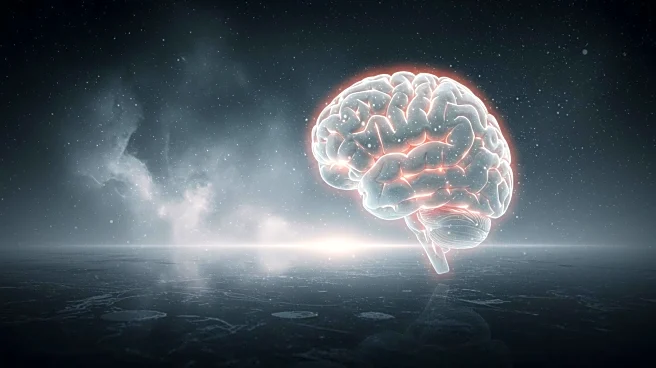What's Happening?
Annaka Harris, a prominent author and researcher, delves into the complexities of consciousness in her work. Harris has been captivated by the subject since childhood, influenced by her experiences with migraines and her father's mental illness. Her bestselling book, 'Conscious: A Brief Guide to the Fundamental Mystery of the Mind,' and her documentary, 'Lights On,' explore the intersections of neuroscience, physics, and consciousness. Harris challenges conventional views that consciousness arises solely from neural complexity, suggesting instead that consciousness might be a fundamental aspect of matter itself. Her work bridges gaps between neuroscience and physics, advocating for a reevaluation of outdated assumptions about consciousness.
Why It's Important?
Harris's exploration of consciousness has significant implications for scientific research and philosophical understanding. By questioning the assumption that consciousness is a byproduct of neural complexity, her work encourages scientists to consider consciousness as a fundamental aspect of the universe. This perspective could lead to new methodologies in studying consciousness and potentially reshape our understanding of the mind and its relationship to the physical world. Her interdisciplinary approach fosters collaboration between fields, potentially leading to breakthroughs in how consciousness is studied and understood.
What's Next?
Harris's work suggests a shift in scientific paradigms, encouraging researchers to explore consciousness as a fundamental element rather than a secondary phenomenon. This could lead to innovative research methods and a deeper understanding of consciousness. As scientists continue to explore these ideas, there may be increased collaboration across disciplines, potentially leading to new discoveries about the nature of consciousness and its role in the universe.
Beyond the Headlines
Harris's approach to consciousness research highlights ethical and philosophical questions about the nature of reality and our understanding of the mind. By proposing that consciousness is intrinsic to matter, her work challenges traditional materialistic views and opens up discussions about the fundamental nature of existence. This could lead to a reevaluation of philosophical frameworks and inspire new ways of thinking about consciousness and its implications for human experience.








